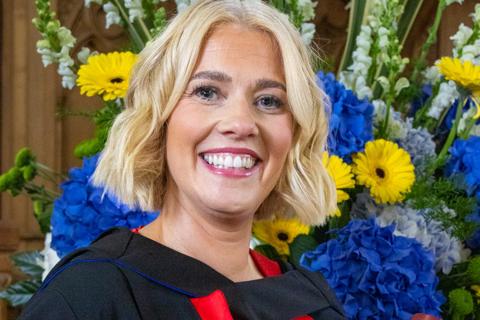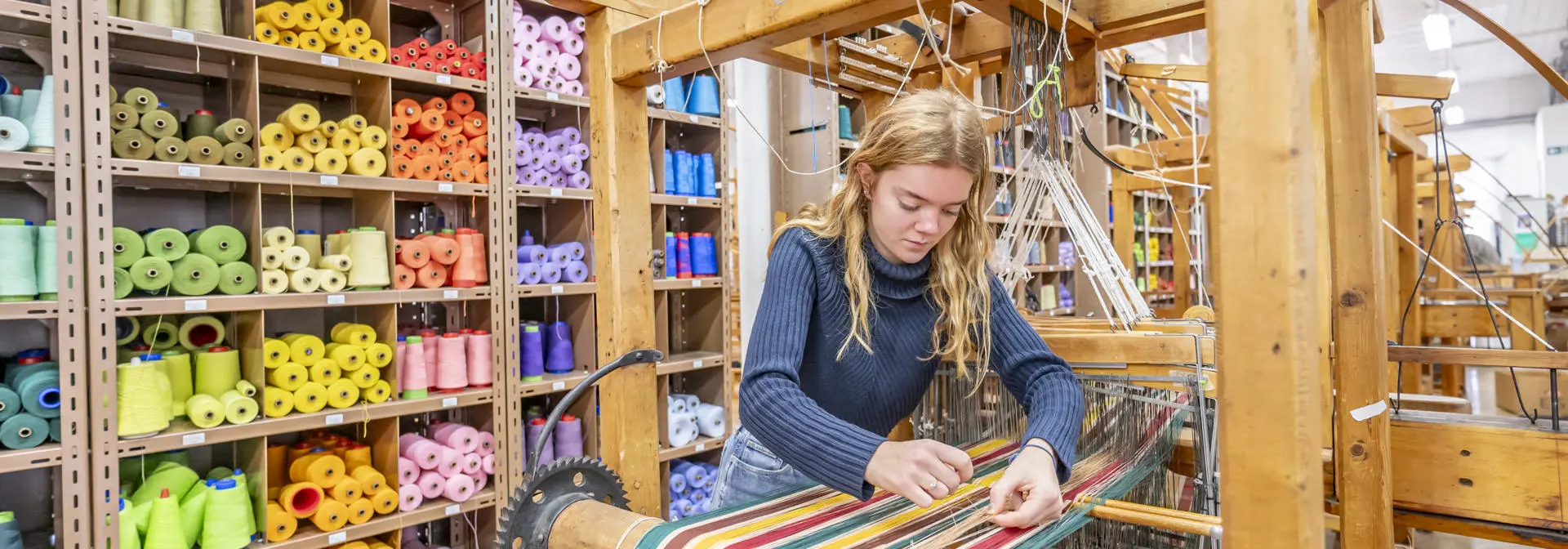Key information
This highly creative textiles course balances theory and practice in fabric design methodology and fabric production techniques.
Find out more about our 3 year honours degree option.
- Programme code
- W232
- Level
- Undergraduate
- Delivery type
- Full Time
- Degree qualification
- BA (Hons)
- Mode of delivery
- On-Campus
- Duration
- 3-4 years
- Location
- Scottish Borders
- Start date
- September
Our BA (Hons) Design for Textiles (Fashion, Interior, Art) programme will provide you with an expertise in designing and producing innovative fabrics for a variety of outcomes. You’ll be encouraged to develop your own visual handwriting and taught how to translate and express this using a variety of media.
At the core of your textile design education is an appreciation of raw materials, innovation in technique, learning an in-depth design process, and how to design sustainably and responsibly to meet both the global and local challenges we face.
The programme underpins originality and innovation with a strong technological understanding, so graduates are well equipped to join industry and make a meaningful contribution to the field. Recent graduate destinations include designers for printed, woven and knitted fashion and furnishing fabrics, accessories, wall coverings, gallery pieces, greeting cards, gift wrap and stationery, new textile product development, trend prediction and colour forecasting, entrepreneurs, practitioners, and educators in sustainable textile design including visible mending.
The combination of general textile lectures with teaching in innovation and design process, will boost your knowledge in both traditional and cutting-edge approaches. You’ll acquire an understanding and knowledge of knitted, woven and printed textiles, digital and Computer-Aided Design (CAD) technologies, marketing strategy, and sustainable practices within the fashion, interior, and textile art industries. This will enable you to respond effectively to the design challenges facing textile and related companies and apply your designs skills to the current and future needs of industry, making you highly employable upon graduation.
In your third year, you will have the opportunity to specialise in print, weave, or knit and either complete an industry placement or a collaborative industry project. Staff will support you in securing placement opportunities or in answering the collaborative design brief. This experience will further develop your knowledge and experience of working with industry and build upon your existing practical and theoretical skills providing you with invaluable industry experience for your CV. During your placement or project, you will have the perfect opportunity to make industry contacts and take another step towards your dream career. In addition, you will have opportunities to travel internationally, such as optional field trips to Paris for Premier Vision or Milan for Fashion Week, or to study abroad via our many well-established exchange programmes to the USA, India, or France to gain a global perspective of the textile industry. Exchange opportunities exist with Thomas Jefferson University in Philadelphia in the USA, The Fashion Institute of Technology in NYC in the USA, the National Institute of Design in India, or at ENSAIT, Anger Cholet or Lyon in France.
In your fourth year, you will complete a textiles project, developing visual, written, and verbal evaluation skills, in response to your self-identified project/design brief. You’ll be required to demonstrate your mastery of textiles, by using colour, fabric making and finishing techniques to produce a contemporary design statement. This programme allows you to develop and apply your learned skills, techniques, and knowledge to undertake your honours project in your final year and build upon your specific interests in design for textiles, which culminates at our Graduate Showcase and normally exhibition at New Designers in London which are both well attended by industry professionals.
Your student experience
Your learning will be informed by our fashion, interiors, textiles, digital design, and marketing faculty and staff whose work covers many key areas including:
-
Smart Nanotextiles – Nano-fibres and Nanoyarns
-
Textile Product Development
-
Fashion Sustainability
-
Design Innovation
-
Printed Textile Design
-
Woven Textile Design
-
Knitted Textile Design
-
Medical Compression Design
-
Textile and Apparel Supply Chain Management
-
Brand Management and Marketing
-
Digital CAD technologies
Go Global
With Go Global, Heriot-Watt's global student programme, you can carry your studies to new places and experience new cultures, expanding your horizons on the way. You'll discover what it means to be a true global citizen and emerge prepared for wherever your career journey will take you.
European Exchange
Worldwide Exchange
Course content
September Intake - Scottish Borders
Year 1
Build a foundation for your future development with a combination of lectures and practical classes designed to help you choose your specialism. Practical projects in printed, woven and knitted textiles and CAD are underpinned by design development projects covering areas such as drawing, painting and material manipulation. We encourage you to explore sampling and mixing techniques to discover a wealth of fabric outcomes.
Mandatory September
- Rethinking Design 2: Develop and Deliver
- Rethinking Design 1: Discover and Define
Mandatory January
- Textiles in Practice 1
- Textiles 1
Year 2
Develop your skills in printed, woven and knitted textile design with outcomes for interiors, fashion or art. With a focus on exploration of textile methods and techniques, you will learn how to translate your original ideas into contemporary fabrics. Organised study tours will bring new opportunities to develop your skills in visual research and market trend analysis, as well as attending industry events such as London Design Week. Importantly, the trips will enable you to make use of the University’s well-established network to make contact with design studios and open up the possibility of internships.
Mandatory September
- Commercial Studies for Design
- Sketchbook Enquiry 1
- Textiles in Practice 2 (Knit)
- Textiles in Practice 3 (Weave)
Mandatory January
- Sketchbook Enquiry 2
- CAD for Design 2
- Textiles in Practice 4 (Print)
- Textiles 2
Year 3
You will be encouraged to show your skills by working on live briefs from external companies and entering national and international competitions. During your third year there is a strong emphasis on preparing for future employment. Specific focus on developing your portfolio ensures that you are ready to apply for internships over the summer period.
Our studio culture environment helps you to develop your skills in critically evaluating your work and creating professional presentations. We offer student exchanges and a foreign study tour so that you can experience trade fairs such as Premiere Vision and Indigo in Paris.
Mandatory September
- Textiles in Practice 5 (Print, Knit, Weave)
- Textile Techniques and Sustainable Practices
Optional September
- Future Textiles & Apparel
- Journalism content creation
- Enterprise and Innovation for Creative Industries
Mandatory January
- Critical & Contextual Studies 3
- Professional Practice For Design
- External Collaborative Design
Year 4
After three years of design work and textile innovation you'll be ready to embark on a personal project. This is accompanied by the choice of lecture series that provides either an in-depth context analysis or forming a marketing strategy for you work. After the completion of everyone's projects, a number of stand-out students are chosen to exhibit their final collection of designs at the New Designers exhibition where the course has been recognised by constantly winning awards from companies such as The Worshipful Company of Weavers, John Lewis and the Clothworkers company.
Mandatory September
- Honours Project 1
Optional September
- Marketing Strategy for Design
- CCS Essay
Mandatory January
- Advanced Practice and Evaluation
- Honours Project 2
Disclaimer
The courses mentioned above may change between now and the time that you study. For more information, please view our Terms and Conditions.
Student testimonials

Anna's story
Graduate, Design for Textiles (Fashion, Interior, Art) BA (Hons)
I am a mature student who has just completed my BA Design for Textiles (Fashion, Interior, Art) with first-class honours. I live locally in the Scottish Borders and have always been interested in textiles, so this programme was a great opportunity to study and learn with fellow like-minded people.See more
See moreI studied Design for Textiles, as I have always been really interested in constructed textiles and the design process behind it. I knew I wanted to study at the Scottish Borders campus as it's known for being the heart of textiles and I wanted to explore the traditional practices used. I felt an extreme sense of pride presenting my designs at the Degree Show as I was able to display all my hard work from my fourth year at Heriot Watt and I was able to see my collection as it came together.
Teaching staff


Mark Parker
Assistant Professor
The BA (Hons) Design for Textiles (Fashion, Interior, Art) programme offers students unique access to the textile industry, providing them with an expertise in designing and producing innovative fabrics for a variety of outcomes. Live projects, internships and travel to national and international trade events make studying on this programme exciting and highly relevant. The programme underpins originality and innovation with a strong technological grounding, ensuring our graduates are well equipped to join the textile industry and make a meaningful contribution to the field of design.
Fees and funding
| Status | Fee |
|---|---|
| Scotland | Paid by SAAS |
| England / Wales / N Ireland / Rep of Ireland | £9,790 |
| International | £20,080 |
- Status: Your residency status is usually defined as the country where you have been ordinarily resident for the three years before the start of your course.
- International: 'International' includes applicants from European Union countries who do not hold Pre-Settled or Settled status in UK. (This does not include students from the Republic of Ireland - see above).
Additional information
Please note that there is an additional consumable fee, charged per year of study.
Scholarships and bursaries
Bursaries for students from England, Northern Ireland or Wales
In addition to government loans and grants towards the costs of fees and living costs, we are offering generous financial support to attract and support eligible undergraduate students from England, Northern Ireland or Wales:
- Heriot-Watt University Bursary (up to £3,100 per year)
Entry requirements
We have standard entry requirements for all of our courses that you will have to meet.
Year 1
Standard entry requirements
- Highers BBBB (over two sittings)
- A-Levels BCC and successful digital portfolio
- International Baccalaureate 29 points
- BTEC Extended Diploma DMM
- HNC C in graded unit
- HND CC in graded units
- Please check that you meet our University-wide National 5/GCSE (or equivalent) English and Maths requirements.
- This programme requires all applicants to submit a Digital Portfolio. Please see "Additional Information" for further details.
Minimum entry requirements *
- Highers BBBC (over two sittings)
- A-Levels BCC
- International Baccalaureate 29 points
- BTEC Extended Diploma DMM
- HNC C in graded unit
- HND CC in graded units
*Minimum: under our Fair Access Policy, we will relax our standard entry requirements for some Scottish and Rest of UK status students depending on their circumstances. Our minimum requirements will apply if you:
- live in an area within the Scottish Index of Multiple Deprivation lowest 20% (SIMD20) or POLAR4 Quintile 1 regions (RUK)
- or are care experienced.
We can also make exceptions for some Scottish students with grades above minimum but below standard. Read more about our Minimum and standard entry requirements.
Year 2
- Advanced Highers BB (plus BBBB at Higher)
- A-Levels BBC and successful digital portfolio
- International Baccalaureate 30 points.
- BTEC Extended Diploma DMM in a relevant subject
- HNC B in graded unit with 120 SCQF credit points in a Textiles relevant subject
- HND BB in graded units in a Textiles relevant subject
- This programme requires all applicants to submit a Digital Portfolio. Please see 'Additional Information' for further details.
Year 3
- HND Textiles BB in graded units
- This programme requires all applicants to submit a Digital Portfolio. Please see 'Additional Information' for further details.
Additional information
- For all years, applications are welcomed from holders of non-school qualifications, mature candidates and overseas students.
- If you do not see your qualifications here please contact us at studywithus@hw.ac.uk
- For applicants studying HNC, HND or BTEC qualifications, when submitting your application please ensure you list in full all the units you are currently studying, as specific units may be required.
Digital portfolio
All prospective students are required to provide us with a portfolio when applying.
In some circumstances, upon reviewing your portfolio, an academic member of staff may contact you to discuss your portfolio further. Online portfolio feedback sessions with an academic will be offered following your submission.
Your portfolio should consist of examples of complete (or ongoing) creative projects and demonstrate a range of skills and competencies including:
- Research and investigation
- Design development and iteration
- Technical skills
- Visual communication and presentation
Your portfolio submissions should be in PDF format with between 10 and 20 images with some explanatory text and full image captions. You can additionally include hyperlinks to other sites that are relevant to your work.
In each portfolio, we are looking for evidence of original thinking. This may be demonstrated through photographs, drawing, or other media. The portfolio should show a progression of your ideas, like a storyboard, rather than a finished piece of work, as the portfolio is intended to demonstrate your ability to think through an idea and show the progression of your thoughts.
All work must be created by you. If you have used AI in any way, this should be clearly referenced/credited.
English language requirements
If your first language is not English, we'll need to see evidence of your English language ability.
The minimum English language requirement for entry to this programme is IELTS 6.0 (or equivalent) with no score lower than 5.5.
If you do not have IELTS 6.0, we offer a range of English language courses to help you meet the English language requirement for this programme prior to commencing your studies.
Please see our detailed English language requirements.
Why Heriot-Watt
We're the top university in Scotland for graduate outcomes which means that more of our graduates are employed or in postgraduate education than any other institution in the country and we ranked 5th in the UK.
We're also rated number one in the UK for CEO or MD roles, meaning more of our graduates go on to become CEOs or MDs than any other university in the whole of the UK. On top of that, we have beautiful campuses, across the globe, so you'll get a truly international education. Our Edinburgh Campus is home to Oriam, Scotland's National Sports Performance Centre combined with plenty of wellbeing resources, prioritising fitness and mental health for all students. Our Global Research Institutes look at solving real world issues such as climate change and saving our oceans as well as working on the next medical technological breakthrough and the future of AI and robots.
Employability
Salary
Potential career paths
- Design occupations
- Artistic, literary and media occupations
Student life
Explore facilities, and chat to staff and students
Discover Uni course data
Discover Uni provides data on each university's degree courses across a range of measures including student satisfaction, graduate jobs and salaries.






